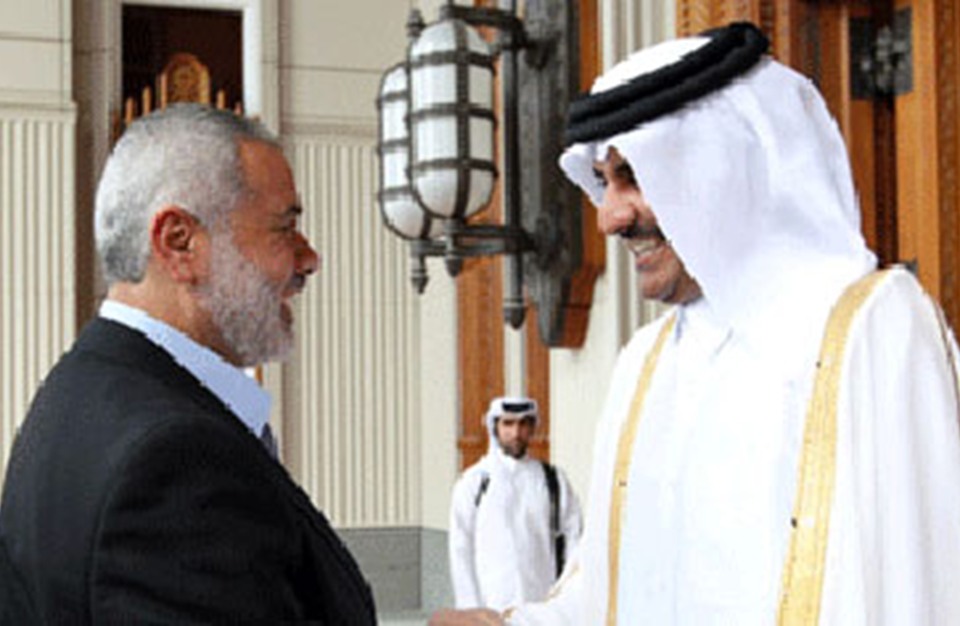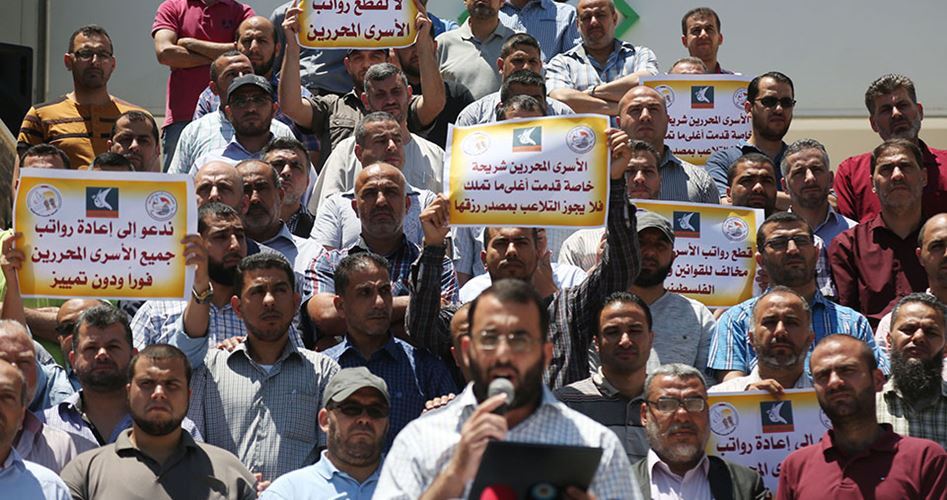www.aljazeerah.info
Opinion Editorials, June 2017
Archives
Mission & Name
Conflict Terminology
Editorials
Gaza Holocaust
Gulf War
Isdood
Islam
News
News Photos
Opinion Editorials
US Foreign Policy (Dr. El-Najjar's Articles)
www.aljazeerah.info
Hamas and the Palestinian Cause Are at the Heart of the Gulf Storm By Said Al-Haj PIC, June 13, 2017 |
 |
 |
 |
| Shaikh Tamim Al-Thani and Isma'il Haniyah, 2016 | Palestinians protest against the PA yielding to Israeli-US pressure to stop monthly payments to families of martyrs and political prisoners, June 13, 2017 |
It is still not clear how difficult the Gulf crisis will be now that
Saudi Arabia, the United Arab Emirates, Bahrain and Egypt have started
their boycott of Qatar, but it is clear that developments are
unprecedented, rolling and open to all scenarios. It is also clear that
Hamas and the Palestinian cause are at the heart of the storm.
All of the justifications presented by these countries for their move,
and the media escalation that preceded them, do not measure up to be the
real motives and reasons for the dramatic developments. Most of them
range between allegations, claims and exaggeration, with some other
regular issues that are not supposed to be such a big deal.
The
events preceding or coinciding with the crisis suggest the real reasons
behind it. This is especially so with regard to Trump’s visit to the
region and the declaration of the “Middle East Alliance” to confront
terrorism and extremism; the establishment of the “moderate” centre; and
the research and media campaign in the US against Qatar in particular,
which went on to include Turkey.
The most logical reasons pop up
in the UAE’s competition with Qatar; the anger at Doha’s foreign
policies, particularly with regards to Hamas and the Muslim Brotherhood;
Saudi Arabia’s succession issue; and the talk about “deal of the
century” whose details are still vague.
As for the language used
in the announcements of Arab states boycotting Qatar, which appear to be
closer to declarations of war than political statements, it tells us
that the story is short; the disreputable axis of Arab moderation is
rearranging its cards, portfolios and priorities with all folly. So,
where do Hamas and the Palestinian cause stand in this unprecedented
storm and what awaits them?
Palestinians still remember the pain
of the repercussions of the Second Gulf War as an Arab-Arab conflict for
which the entire Arab world paid the price, and still does. The
Palestinian cause had its share in a path that began in Madrid and
continued in Oslo and has not ended yet, but it seems that the
repercussions for Hamas, Gaza and the Palestinian issue today are more
critical and dangerous.
In the light of the recent crisis and the
previous developments, there are several challenges facing Hamas in
particular and the Palestinian resistance in general, and inevitably the
Palestinian issue in the coming period.
First up is the worsening
of financial distress affecting Hamas due to the crises in the region as
well as internationally-imposed restrictions. The centre of “moderation”
will focus on following up what will be considered “extremism” and not
just those organisations listed as “terrorist entities”, according to
the US and Trump definition as announced at the summit in Riyadh. Hamas
is designated as a “terrorist” group and will thus face further
restrictions, especially from the Gulf States. Of course, it is no
secret that the continuation of the financial crisis will mean yet more
deterioration in the living conditions in the Gaza Strip, which is
something that several parties will seek to exploit to turn things
against Hamas in the besieged territory.
What’s more, a new
Israeli offensive against the Palestinians in the Gaza Strip will be
more likely than ever as the winds of the Arab revolutions weaken; the
Arab axis of moderation continues with its policies; counter-revolutions
develop; and as long as there is both tacit and open approval by some
Palestinian factions and individuals. Not only that, but also because
the Arab world will be too busy with the Gulf-Gulf crisis, and Arab
regimes are crumbling, which means that even the minimum level of verbal
and political denunciation and condemnation of Israel and its occupation
won’t be available.
In addition, we will see the activation of
Trump’s so-called “deal of the century”, with Al-Sisi and others
“solving” the Palestinian issue — for which read “liquidating” it — by
proposing a weak political solution accepted by some Palestinians. Its
opponents won’t find any regional or international support to stop it,
not least because all we know about this deal is its title, while its
goals, timetable, gains and losses are not clear at all.
Furthermore, we are seeing the potential loss of the regional incubator
in Qatar and Turkey, which are two countries with a known policy of
supporting Hamas, the resistance against the Israeli occupation and the
Palestinian cause. Although their role is limited to the media, politics
and aid, they are being required to curtail and stop it. This will mean
the possible repositioning of some Hamas leaders currently in exile in
Doha until and unless the crisis passes. Hamas’s ability to withstand
united Gulf pressure, with implicit US backing, is weak, and so all it
can do is bend with the wind and let the storm pass, if possible.
The problem with this, of course, is its complexity. The exiles whom
Qatar may not be able to host during the crisis may not be able to be
hosted by Turkey either. This means greater fragmentation for the new
Hamas leadership and more challenges in the new countries in which they
find refuge, including political and security issues.
Finally,
there is a threat to the future of the movement and its political
programme and rhetoric; it’s a long-term challenge with the least
likelihood, but it remains a possibility. Trump’s speech, the Riyadh
summit and then all of the current developments came after the
announcement of a new “flexible” policy by Hamas. This means that the
plan is to use more of the stick and not the carrot against the
movement, placing further restrictions on it financially, politically,
militarily and geographically. It is expected that this will be used to
push for even more “flexibility” to be demanded from Hamas, which has to
be aware of this.
What options, therefore, does Hamas have? I
think that they are limited. Naturally, the movement has to deal with
the crisis. This requires trying to ease the pressure on its Qatari
friends while searching for interim and long-term solutions. This might
include concentrating the leadership in the Gaza Strip, or turning
toward Tehran once again.
However, rapprochement with Iran is not
necessarily a wise option to take and cannot be a solution to the
problem. It would have the effect of increasing restrictions on the
movement, clearly categorising it regionally and internationally
according to circumstance that have no guaranteed repercussions or
consequences. In addition, Tehran no longer has the same desire to
resume its relations with, and support, for Hamas.
This is bigger
than a Gulf-Gulf crisis; its causes are more complex and its
consequences are more dangerous than can be covered in a brief article.
The only constant is that this snowball has started its descent and it
is hard to stop; it will be difficult if not impossible to restore
relations and conditions without significant concessions, or profound
transformations, both of which are very damaging to the Palestinian
cause. It is ironic that this should now be suffering from a degree of
Arab unity and a crack that has appeared in the apparently once-unified
Arab edifice.
***
Israeli so-called parliament approved the first reading of a bill to deduct the Palestinian prisoners' allowances from the tax revenues going to the Palestinian Authority
OCCUPIED JERUSALEM, (PIC) + -
The Israeli so-called parliament (Knesset) Ministerial Committee on Legislation approved on Sunday the first reading of a bill to deduct the Palestinian prisoners' allowances from the tax revenues going to the Palestinian Authority, according to Hebrew media sources.
The Hebrew sources reported that the ratification came despite the objection of the government's Attorney General, but a consensus was reached not to put the bill vote in the three readings because it will be merged later with a government bill related to the matter.
Yedioth Ahronoth newspaper said that the bill, initiated by MK Elazar Stern for Yesh Atid party, provides for deducting the prisoners' salaries from the tax revenues transferred by Israel to the Palestinian Authority.
In conjunction with the vote on the law, 180 Israeli families, whose soldiers were killed in resistance operations, filed a petition to the Israeli Prime Minister Benjamin Netanyahu demanding him to work to pass the law.
US Secretary of State Rex says the Palestinian Authority (PA) is serious about its promise to “cease the payments” to Palestinian prisoners’ families
RAMALLAH, (PIC ) + -
The US Secretary of State Rex Tillerson said on Tuesday during a hearing on Capitol Hill before the Senate Foreign Relations Committee about the State Department’s budget that the Palestinian Authority (PA) is serious about its promise to “cease the payments” to Palestinian prisoners’ families.
“They have changed that policy, and their intent is to cease the payments to the families of those who have committed murder or violence against others,” Tillerson reassured the Senate committee.
“We have been very clear with them that this is simply not acceptable to us,” he added.
The PA has earlier decided to stop paying salaries to some 250 Palestinian prisoners released from Israeli jails.
Palestinians protest against the PA yielding to Israeli-US pressure to stop monthly payments to families of martyrs and political prisoners
GAZA, (PIC) + -
The Hamas Movement has reiterated its condemnation of the Palestinian Authority’s (PA) compliance with the Israeli-US request to cut off monthly payments to prisoners and families of martyrs.
In Facebook remarks, Hamas spokesman Hazem Qasem said that “PA chief Mahmoud Abbas’s submission to the Israeli-US demands calling to discontinue paying salaries to prisoners and families of martyrs means that he is persistent in liquidating all components of the Palestinian cause and destroying the foundations of the national work.”
Qasem accused the PA leaders of going too far in making concessions at the expense of the Palestinian cause in order to ensure continuity of the privileges provided for them by Washington and Tel Aviv.
Addressing the Senate on Tuesday, US secretary of state Rex Tillerson said that Abbas would stop the policy of providing the Palestinian families of those who attacked or killed Israelis as well as the prisoners in Israeli jails with monthly financial support.
This came after Israeli premier Benjamin Netanyahu and his right-wing government pressed recently the Trump administration to cut off aid to the PA unless such payments stop.
***
Share the link of this article with your facebook friends
|
|
|
|
||
|
||||||


